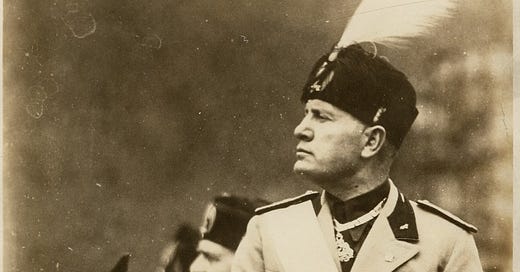"Il Duce!" Mussolini - The Father of Fascism
Mussolini's Quest for Autarky and the Road to War
An hour marked by destiny beats in the skies of our fatherland.
The words resonated through the air like a tempest, swirling above the heads of thousands gathered in Piazza Venezia. It was June 10, 1940, and Benito Mussolini stood upon the balcony of Palazzo Venezia, his posture rigid, eyes fierce—a man embodying the fervor of a nation teetering on the brink of monumental change. The declaration of war against Great Britain and France wasn't merely a political maneuver; it was the climax of a vision Mussolini had nurtured—a vision of a self-reliant Italy rising like a phoenix from the ashes of past humiliations.
To grasp the gravity of that moment, we must journey back to the roots of Fascism, to the tumultuous path that led Mussolini to that balcony, and to the relentless pursuit of autarky that fueled his ambitions.
From Blacksmith's Son to "Il Duce"
Born in 1883 in the modest town of Predappio, nestled in the northern hills of Italy, Benito Amilcare Andrea Mussolini was a child of contradictions. His father, a blacksmith with fervent socialist leanings, and his mother, a devoutly Catholic schoolteacher, infused in him a blend of radicalism and discipline. The young Mussolini was a restless spirit, expelled from schools, yet undeniably intelligent and charismatic.
World War I shattered the world Mussolini knew. The trenches, the senseless slaughter, the disillusionment with a government that seemed impotent—it all ignited a transformation within him. Abandoning his earlier socialism, he envisioned a new ideology, one that married the strength of nationalism with the unity of collectivism, under the guiding hand of a singular, indomitable leader.
The Birth of Fascism
In 1919, he founded the Fasci Italiani di Combattimento, tapping into the veins of a nation bleeding from economic strife, social unrest, and a profound sense of betrayal by its World War I allies. The streets were battlegrounds, with black-shirted squads clashing against socialists and communists. Mussolini orchestrated this chaos with the precision of a maestro, each skirmish amplifying his call for order through strength.
By 1922, Italy was a tinderbox, and Mussolini struck the match. The March on Rome wasn't just a demonstration; it was a calculated gamble that paid off. King Victor Emmanuel III, fearing civil war, handed the reins of power to the audacious 39-year-old. Mussolini became the youngest Prime Minister in Italian history, soon styling himself as "Il Duce"—"The Leader."
The Pursuit of Autarky
Keep reading with a 7-day free trial
Subscribe to The Revolutions to keep reading this post and get 7 days of free access to the full post archives.




